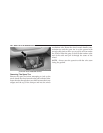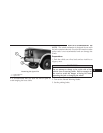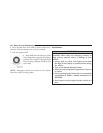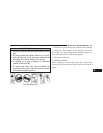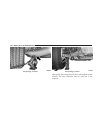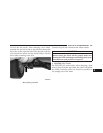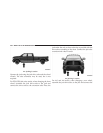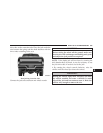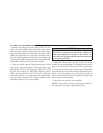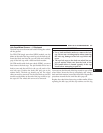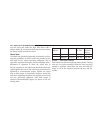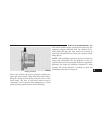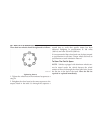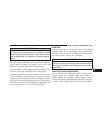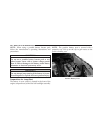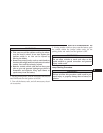
5. Remove the wheel nuts and pull the wheel off. On
single rear-wheel (SRW) trucks, install the spare wheel
and wheel nuts with the cone shaped end of the wheel
nuts toward the wheel. On 3500 dual rear-wheel models
(DRW) the wheel nuts are a two-piece assembly with a
flat face. Lightly tighten the wheel nuts. To avoid the risk
of forcing the vehicle off the jack, do not fully tighten the
wheel nuts until the vehicle has been lowered.
6. Using the wheel wrench, finish tightening the wheel
nuts using a crisscross pattern. The correct wheel nut
tightness is 130 ft lbs (177 N·m) torque (1500 Series), 135 ft
lbs (183 N·m) torque for 2500/3500 single-rear wheel
(SRW) models, and 145 ft lbs (197 N·m) for 3500 dual
rear-wheel models. If in doubt about the correct tight-
ness, have them checked with a torque wrench by your
authorized dealer or at a service station.
WARNING!
A loose tire or jack thrown forward in a collision or
hard stop could injure someone in the vehicle. Al-
ways stow the jack parts and the extra tire and wheel
in the places provided.
7. Install the wheel center cap and remove the wheel
blocks. Do not install chrome or aluminum wheel center
caps on the spare wheel. This may result in cap damage.
8. Lower the jack to its fully closed position. If the bottle
jack will not lower by turning the dial (thumbwheel) by
hand, it may be necessary to use the jack drive tube in
order to lower the jack. Stow the replaced tire, jack, and
tools as previously described.
9. Adjust the tire pressure when possible.
NOTE: Do not oil wheel studs. For chrome wheels, do
not substitute with chrome plated wheel nuts.
496 WHAT TO DO IN EMERGENCIES



